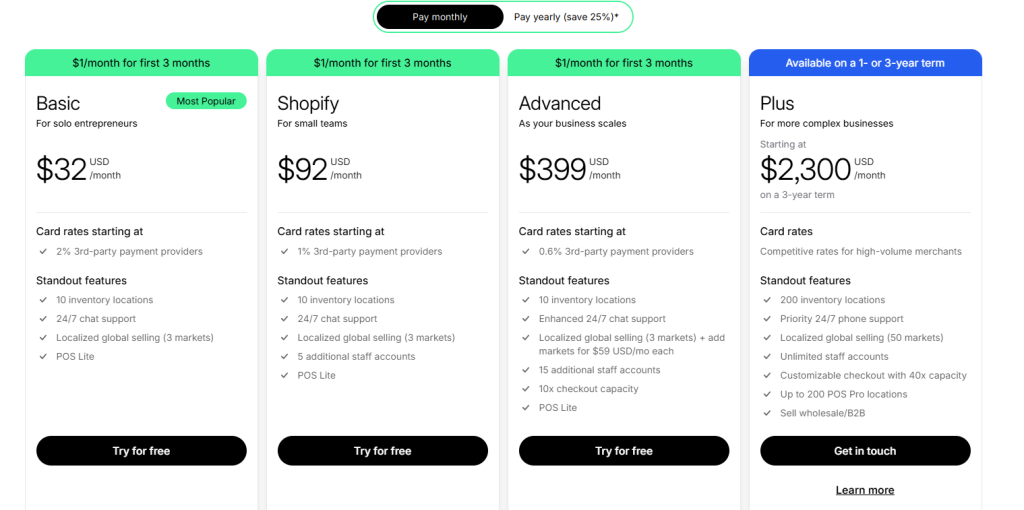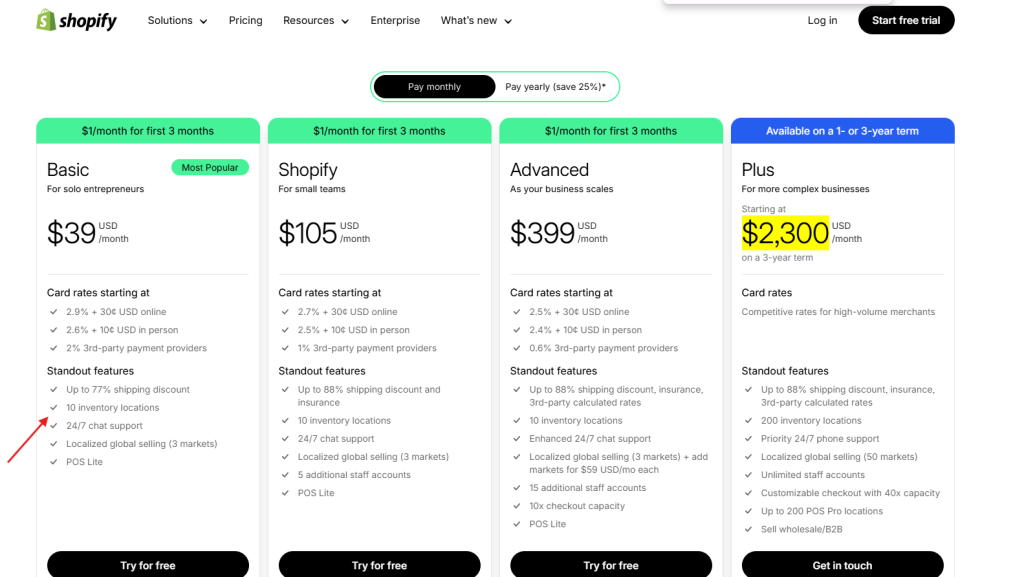How Much Does an Ecommerce Website Cost in 2025?
Editor’s Note: This post was originally published in July of 2023 and has been updated for accuracy and comprehensiveness.
Remember that time you saw a quote for $25,000 to build your online store and nearly fell out of your chair? I’ve been there. After helping dozens of businesses launch their e-commerce websites, I’ve discovered most entrepreneurs overpay because they don’t understand which components actually matter.
For most small to medium businesses, you can build a fully-functional ecommerce website for $1,000-$3,000 in the first year (without expensive developer time). Your exact cost depends on whether you choose a ready-made solution like Shopify or build from scratch with WordPress, and I’ll show you exactly what drives those price differences.
This guide breaks down real costs for each essential component of your online store, from hosting to security, so you can create a realistic budget that won’t leave you with sticker shock or an incomplete website.
The Components of an E-commerce Website and the Associated Cost
1. Web hosting
This is the foundation of your online store; it’s the service that stores your website files and makes them accessible to customers.
Think of it as renting digital real estate for your business. There are four types, though:
- Shared hosting costs between $2 and $15 monthly (depending on the hosting provider). This is perfect for new stores with less traffic. Here’s how Hostinger describes it:

Shared hosting places your website on a server with other sites. It’s like sharing a room with a roommate—affordable but with limited space and resources. Some shared hosting services come with a free domain and unlimited SSL certificates, so you won’t have to pay for those separately.
- Cloud hosting costs between $50 and $200 per month. As your store grows, cloud hosting has more flexibility to handle your growing traffic without compromising reliability.
It lets you keep everything in your own space, and you can scale up for more web space as your business grows and traffic increases.
- VPS (Virtual Private Server) Hosting: This service can cost up to $1,200 annually. VPS gives you a dedicated virtual environment (more CPU, RAM, and storage) on a physical server so you can have more control over your resources. Here’s how Hostpro describes it:

Think of it this way: you are paying for a whole floor in an apartment building. You’re not sharing a room (shared hosting) or an apartment (cloud hosting) but the whole floor.
- Dedicated hosting can cost between $100 and $500 per month and is usually for businesses with a lot of CPU, RAM, and storage needs. It basically involves extra servers to power your heavy traffic, content needs, and security systems. It’s like owning your building—it’s expensive, but you have maximum performance and control.
One of the things to consider while choosing your preferred hosting type is your traffic volume. More visitors mean more server resources, so it’s typically better to use cloud rather than shared hosting. You should also consider the volume of products you want to sell, the features the website will have, and a host of other things you’ll discuss with your developer.
2. Domain name
Your domain name is your store’s digital address—the text customers type to find you online. It’s the equivalent of amazon.com, homedepot.com, and walmart.com for your website.
It’s also your first chance to build brand recognition and credibility. So, what determines the cost?
Domain prices range between $10 and $20 per year. It varies based on your TLD (Top-Level Domain) and subscription length (whether you’re paying annually, which has discounts, or monthly, which doesn’t).
Here’s a list of different domain extensions (TLD) with their price tags:
- .com domains – Usually pricier ($10-15/year) but have the most credibility. That’s why most websites use a .com domain.
- .store domains – these are specifically designed for e-commerce websites ($10-20/year). However, not every e-commerce store uses it. Regardless, some, like Dude Perfect (dudeperfect.store) and The Cabinet Door (cabinetdoor.store), use it.
- .business domains – these are an alternative option and less expensive than .com domains. They’re usually used by consultants or enterprises to indicate the business extension of their services.
There are many web hosting and domain name registrars online, so check out the options and choose the best price and services. You can also consider URL best practices while deciding your domain structure. Next, website development.
3. Website development
The development phase is where your e-commerce website vision starts to take shape. The website development fees depend on your platform of choice and how you want the website to look. Let’s start with the two common categories:
- Built-for-you software as a service e-commerce platforms
For context, all-in-one e-commerce platforms like Shopify, Wix, BigCommerce, and Squarespace have ready-made e-commerce infrastructure. Depending on your desired features, it costs between $29 and $299/month.
For example, Shopify’s plan starts at $32/month for basic features and scales up to $399/month with enhanced/better capabilities, including 15 additional staff accounts, 10x checkout capacity, and more discounts on card payments (2.5% + 30¢) compared to 2.9% + 30¢ on the base plan. It also has a three-year Plus plan for $2,300/month.

Typically, all-in-one e-commerce solutions include hosting, domain registration, security, basic template design for your e-commerce website, and core e-commerce functionality embedded in their pricing.
Everything is in one place. To set up your e-commerce website, you just need to pay your subscription fee and input everything about your business into it.
The tradeoff? Less customization and consistent subscription costs.
- The alternative: self-hosted solutions
Self-hosted solutions, such as WordPress.org, WooCommerce, Drupal Commerce, or Magento, have more flexibility while building websites. Unlike hosted platforms, these solutions require you to manage hosting and other components independently.
This means you pay separately for hosting, domain names, and additional features like themes and plugins. With self-hosted platforms:
- You download the core software (e.g., WordPress.org) for free.
- You choose a hosting provider to store your website files. You can choose between shared hosting, VPS, or dedicated, depending on your needs.
- You purchase a domain name to give your site a unique web address.
- You customize your site using themes (for design) and plugins (for added functionality). If you don’t like the basic features available, you may need to pay for premium themes and plugins.
This setup gives you complete control over your website’s structure, design, and functionality. However, it also requires more technical expertise than hosted solutions.
4. Web design
An attractive web design is all you need to convert visitors to customers.
Well, not all you need. But it’s really important, given that 59% of consumers prefer beautiful designs over a simple and plain website. This means they’re more likely to buy from a well-designed e-commerce website.
If your store is more functional and easy to navigate, they’ll love it more. So, what are your options?
You can use pre-built templates in Shopify (an all-in-one e-commerce solution) or WordPress (self-hosted).
You can also go for the paid templates in both categories of e-commerce solutions.
For free templates, Shopify has 12 free themes, and WordPress has 13,000 free themes. However, paid ones on Shopify can cost between $120 and $400 as a one-time purchase. WordPress premium e-commerce themes typically range from $35 to $200. It all depends on the flexibility you need.
Free templates work well while starting out, but premium options generally have better features, support, and updates.
However, you can customize templates too.
The web designer will charge you more for this, which can be as little as $300 or as much as $3,000+. It all depends on what you need in the custom design.
5. E-commerce functionality and features
Your e-commerce website needs to function with features like product management, which are usually included in most platforms’ pricing tiers. That’s why you can list products, categorize them, and enjoy inventory tracking features.
For example, Shopify includes all these in its starting price.

By the way, Shopify seems to have reduced its subscription cost within a few days. This screenshot shows $39/m, and the first one, which I took four days later, has $32/m.
But with WordPress, WooCommerce, and others, these features come free with the base plugin.
However, you may need to pay more for specialized features, such as abandoned cart recovery, advanced search filters, extra inventory locations, multi-currency and international shopping support, reviews and ratings, customer account and wishlist functionality, etc.
All these come with a cost. Most premium plans from all-in-one e-commerce solutions have these advanced features, but you’ll pay for them via plugins for self-hosted platforms.
6. Website maintenance and security
You need to ascertain the security of your e-commerce store every time. This helps you protect your business and customer data, which you definitely don’t want leaking to hackers because it can cost you your business.
Here are some key aspects to consider:
First, software updates and patches:
- Shopify includes automatic software updates and patches as part of its service.
- WordPress offers free updates, but you’ll need to hire a developer to implement them, which may cost between $50 and $150 per hour, depending on the complexity.
Secondly, backup systems:
- Shopify automatically backs up your data.
- WordPress basic hosting also includes backups, but premium backup solutions using plugins like UpdraftPlus or Jetpack can cost between $5 and $50 per month.
Third, security certificates and compliance:
- SSL certificates help encrypt customer data. They’re usually free, but the extended validation SSL can cost as much as $500 per year.
- PCI compliance is mandatory for websites accepting credit card payments. Shopify includes PCI compliance in its service, while WordPress requires setup and potentially additional costs (e.g., $500–$2,000 annually for tools or consultants).
For additional security measures, you may need to invest in:
- Fraud prevention analysis (tools and services to detect and prevent fraudulent transactions).
- Vulnerability scanning (regular checks to identify and address security vulnerabilities and
- Multi-factor authentication (MFA) increases login security by requiring additional verification steps.
While these security measures are important, small businesses may not need all of them. However, investing in basic security measures like SSL certificates and regular backups is essential.
Note: This list should include marketing and SEO costs, but we’ll limit them to core website design costs.
That’s because typically, the developer you hire (or you DIY-ing the website development process) should already optimize your website for page speed and other mobile-friendly elements to make it easy to use.
Now that you know what the typical cost of an e-commerce website is, let’s discuss the different approaches to building your website:
Four Ways to Build Your E-commerce Website in 2025
There are four ways to handle your e-commerce website development process. You can DIY on all-in-one e-commerce platforms like Shopify, DIY on self-hosted solutions like WordPress, or hire freelance developers or web development agencies.
Let’s explore the scenarios that would require you to either DIY or hire extra help.
1. DIY with all-in-one e-commerce platforms (Shopify, Squarespace, etc.)
Best for small businesses and beginners or business owners with limited budgets.
Building an e-commerce website on these platforms requires little technical skill and a low to medium time investment. You can complete the website development and design process in a week.
How much will this cost? It ranges from $40 to $300/month plus apps. For example, Shopify’s base plan is $32/month. If you pay for a custom template, this price may change. And if you go for a pricing tier with more features, the base amount will increase, too.
However, these all-in-one e-commerce solutions are easy to set up, have built-in hosting, and can register your domain name as well.
The downside:
- Less customization.
- Monthly or annual subscription costs.
- Transaction fees.
2. DIY with self-hosted solutions (WordPress, WooCommerce, etc.)
Best for budget-conscious small business owners with some technical skills.
The technical skill required is medium to high, and the time investment is relatively high. There are a lot of things to plug in, and it takes time to customize the whole setup to meet your taste.
Plugins cost between $50 and $300 or more, depending on the level of customization needed.
However, you have more control, it’s potentially cheaper to operate in the long run since it’s self-hosted, and you have a lot of flexibility in terms of customization.
However, the downside is that:
- It requires technical expertise. It’s a daunting exercise if you haven’t developed a website before.
- It requires separate hosting.
- It has more maintenance needs as it’s not done for you automatically.
3. Hiring freelance developers
Best for businesses with custom needs but a limited budget.
Freelance developers are highly skilled, although they may not have the expertise you need across the board. For example, some may be great at developing a solid backend for your website, but their web design skills are lacking.
Others may be incredible at web design but cannot help with the technical SEO elements as a specialist would.
Regardless, they can develop a reliable website for your business on all-in-one e-commerce solutions like Shopify and Wix or self-hosted platforms like WordPress and WooCommerce.
Here, you only need to invest management time (not development or design). Costs are usually between $30 and $80/hour (or more for specialized skills) or $500 to $5,000 per project (or more, based on what you want).
The upside is that they’re more affordable than agencies, and you can use their specialized skills to get what you want. However, the downside is that:
- They are not as specialized as web development agencies, which have experts for different parts of the website development process.
- They may not be readily available, as reliable freelance developers are hard to find.
- There can be quality or security issues, especially if they don’t have a verifiable track record.
- They may provide limited ongoing support.
4. Contracting web development agencies
Best for complex stores and enterprise businesses,s but is also ideal for small businesses that need a lot of functionality in their e-commerce store.
A web development agency should have high technical skills, and you don’t need to worry about directly managing them.
The best web development and design agencies will schedule regular calls with you to give progress reports. This differs from the kickoff call, which is to learn everything you want so they can build the perfect e-commerce website for your business.
However, the entire service may cost between $5,000 and $30,000+, depending on the complexity and add-ons you need. The upside is that they have a full-service approach, provide ongoing maintenance support, and can get you the best results.
The downside:
- It’s expensive.
- And if you’re a really small business without much need for complex designs of advanced features, hiring them might be overkill.
Factors that Influence the Cost of an E-commerce Website?
There are several things to consider when calculating the likely cost of building and maintaining an e-commerce website.
- For example, how many product lines do you have? What are your sales targets? And what are your traffic goals?
- Other factors include the level of functionality you need, the cost of add-ons and integrations, and whether you use an all-in-one e-commerce solution or opt for a self-hosted one.
- Think about all these and whether you want to work with a freelance developer or an agency.
- Also, consider the size of your website.
It might determine if you’ll need cloud hosting or a virtual private server (based on your potential traffic).
- Lastly, consider the costs for SEO and marketing.
There’s no use building an e-commerce website if customers can’t find it.
SEO involves a series of back-end changes, content tweaks, and link-building initiatives that make your site more visible in search results. This is important since organic search accounts for an average of 41% of e-commerce traffic.
Keep in mind that optimizing a site for organic search visibility during the development phase is much easier than leaving it until after the site has launched.
So, when calculating the cost of your online store, be sure to factor in e-commerce SEO and any other promotional strategies you plan to use.
What About E-commerce Maintenance Costs?
The work doesn’t stop after you’ve launched your e-commerce store.
You’ll need an ongoing maintenance program to ensure your site continues to run smoothly, delivering a consistent user experience for your customers.
Remember, what’s cutting-edge today will be outdated in just a few years.
Some of the biggest cost factors associated with website maintenance include the following:
- Web hosting
- Annual domain name renewal
- Marketing and advertising
- Ongoing development and feature upgrades
- Payment processing
- CMS subscription
- Security measures
- Analytics and reporting
- Administrative costs
So, what can you expect to pay for ongoing website maintenance?
Anywhere between $100 and $10,000, depending on the size of your site, your technical infrastructure, and the vendor you choose.
Final thoughts
Experts believe that e-commerce will account for 95% of all shopping by 2040. So if you don’t have an e-commerce website yet, it’s time to get one!
We’ve seen that the cost of building and maintaining an ecommerce website depends on various factors, from the level of functionality you need, whether you opt for a pre-built or custom solution, and how soon you want your site to be up and running.
When you decide to find a web development agency to help bring your e-commerce goals to life, make sure you’re shopping around. Use the benchmark figures and cost breakdowns in this post to help you evaluate different quotes and proposals.
And for more information on website costs, take a look at our guide to web design pricing.
